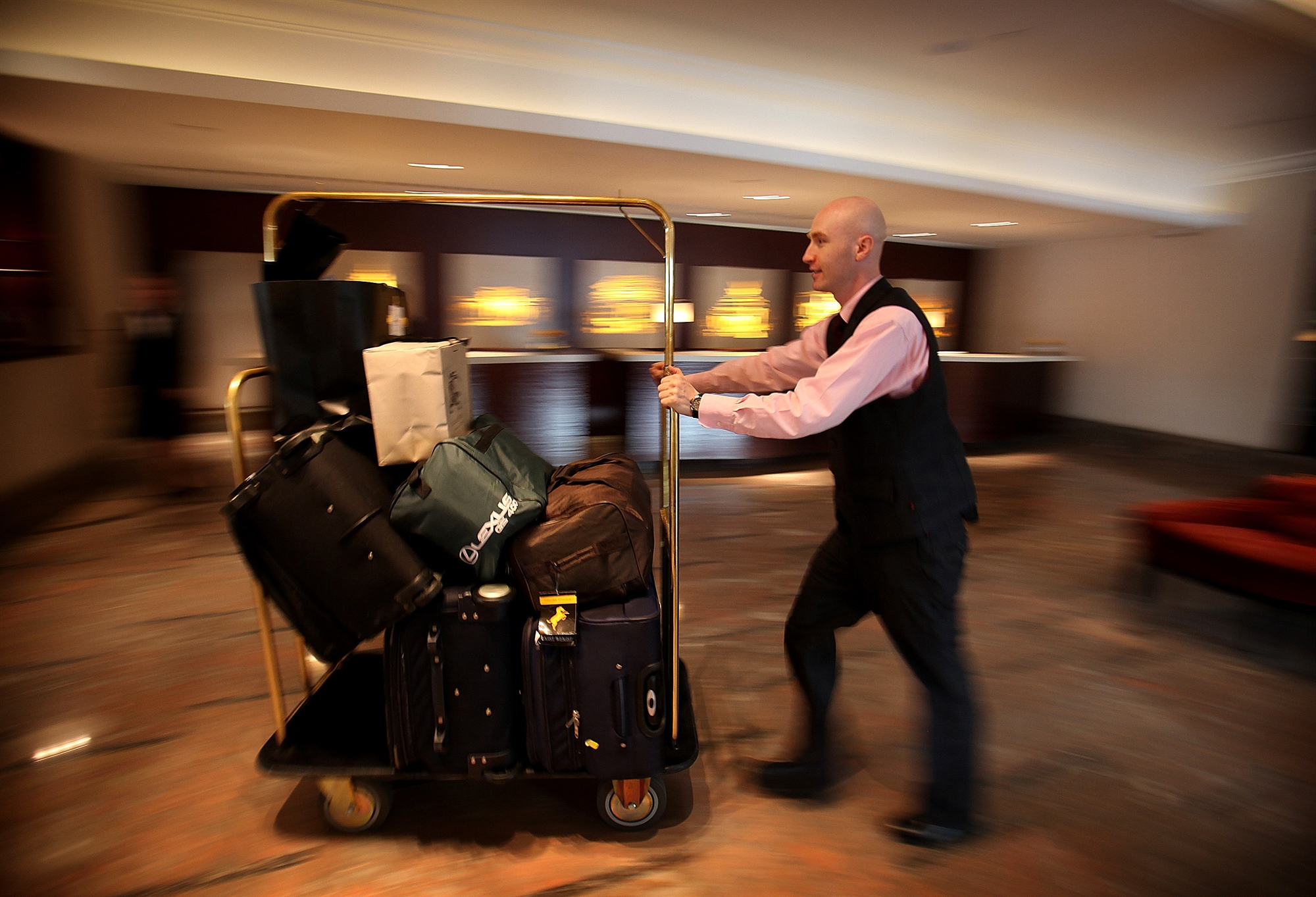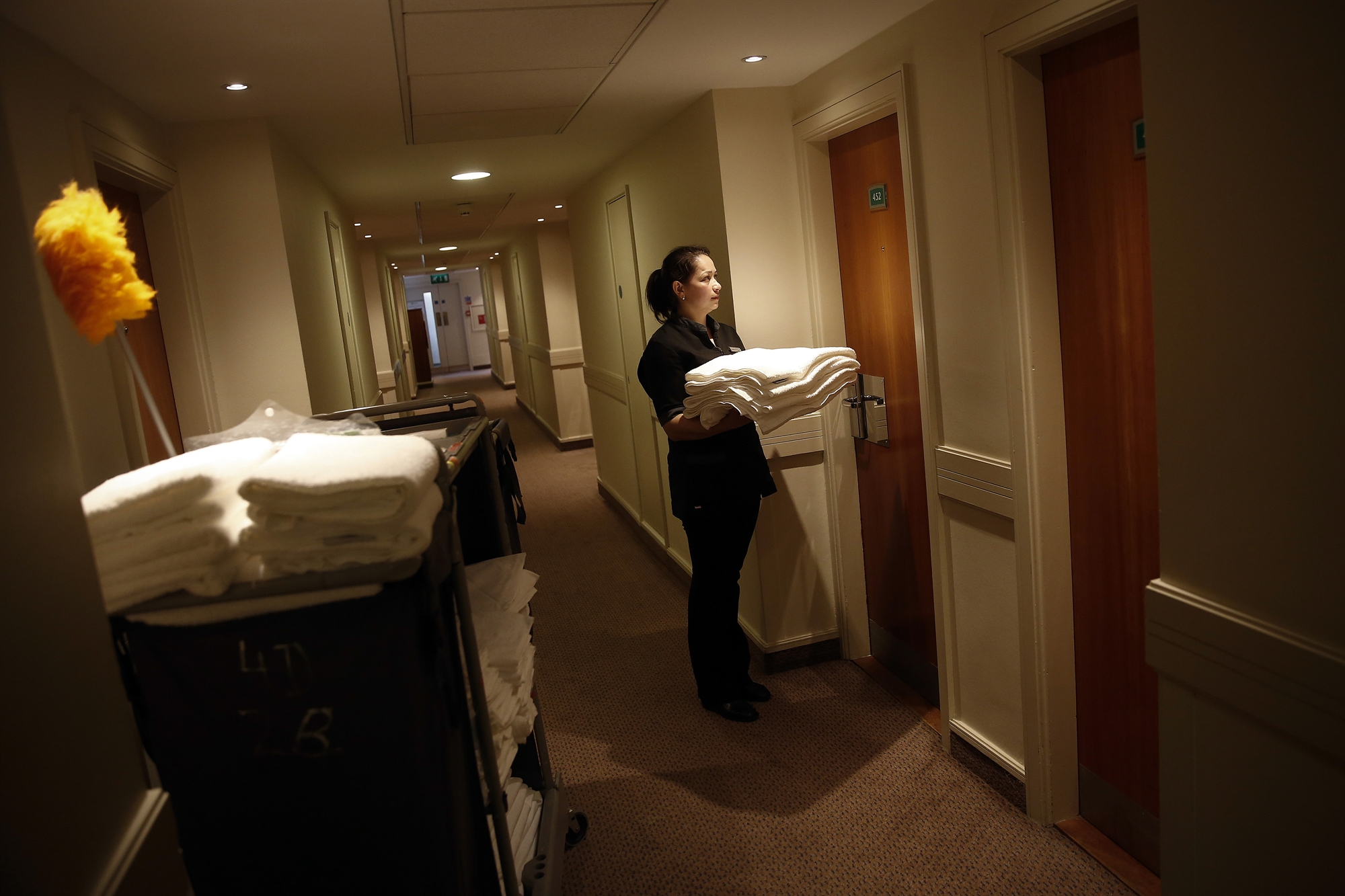
Employees from non-EU third countries will be able to “import” tourism enterprisesaccording to the ministerial decision, to cover them vacancieswhich are estimated to reach 75,000. Although there is an active industry agreement with wages above the minimum, hoteliers they cannot find staff, especially in some professions such as waiters, waitresses, gardeners, etc. The problem is exacerbated by institutional distortions that reinforce “menial” work.
Import workers for gaps in tourism
Rula Salurou
Workers from third countries outside the European Union will now be able to be “imported” by tourism companies to fill the large gaps seen in the tourism industry in recent years.
On 7 March, a ministerial decision was published in the Government Gazette (B΄ 1314), which for the first time officially includes tourism in sectors that can employ third-country nationals, and now, according to classified informationa new decision is expected, which will determine the terms and conditions for initiating the procedure.
Time is running out as it could be completely lost in 2023 due to existing bureaucratic hurdles. In this second Joint Ministerial Decision (JDM), the total authorized number of transferable workers from countries such as Afghanistan, Pakistan, Syria, and Egyptas well as special
It should be noted that at the previous meeting Supreme Labor Council (ASE)In the presence of GSEE President Yiannis Panagopoulos and his representatives, discussions began on the request of the employers’ bodies of the industry to introduce posted workers from third countries. Federation of Tourism and Catering Workerswho protested strongly. Finally, the ASE, following an objection submitted by the GSEE, was deemed incompetent to take a decision on this matter.
It is estimated that the shortage of personnel in the tourism industry alone by 2023 could reach five figures across the country, especially in heavy and low-skilled professions.
For the first time, the ministerial decision officially includes tourism among the sectors that can employ third-country nationals.
In particular, to the already calculated 60,000 vacancies for 2023, it is expected to add about 15,000 seasonal workers who applied for re-employment (the deadline expired at the end of January), but did not return to the hotel where they worked last year, probably because they found somewhere else to work. In addition, it is estimated that foreign workers who worked in the hotel divisions in our country in previous years will choose a country with higher wages this year.
Thus Panhellenic Federation of Hoteliers and Hellenic Chamber of Hotels (HCL) in their letter to the relevant ministries, they have long requested the recall of workers from third countries in the tourism sector, as well as changes to the relevant legislative framework.
They asked, among other things, to amend Law 4251/2014 to allow the tourism sector to transfer seasonal workers from third countries, as well as to simplify transfer procedures, mainly in terms of controlling the number of registered unemployed by region, but also solving problems, existing for type D entry visas in countries where Hellas consular authorities, it is possible to create a visa center. Representatives of hoteliers noted that this sector is one of the few in the Greek economy whose labor relations are regulated by a sectoral collective labor agreement, which even provides for specific, significantly higher than the legal minimum wage, as well as institutional guarantees for workers in it.
Danger
For their part, of course, workers in the sector, through the Panhellenic Federation of Food and Tourism Workers, point to the need to extend the contract with hotel workers to all companies operating in the sector, responding to the entry of 80,000 migrant workers. from third countries and point to the risk of creating income and labor inequality, as well as practical difficulties, since it is not clear, among other things, with what wage and labor conditions the transferred workers will work in our country, how these conditions will be provided and how long they will Contract.
Accredited lawyers point to “K” that the minimum wage is the minimum reliable protection for every worker in our country, but in the tourism sector, where there is an active industry contract, there is a risk of a large income inequality between Greeks and immigrants.
In which specialties is there an acute shortage of personnel?
Ilias G. Bellow
Greek hotel companies will now look abroad for specialty tourism workers, which the Greeks are clearly not interested in filling when the necessary process is completed. The problem of shortages in tourism became particularly evident last year when, despite being offered wages in excess of the national collective bargaining agreement, hoteliers were unable to fill all of the staff positions. The shortage of the so-called “heavy” tourism trades is estimated to be between 50,000 and 75,000 workers and could increase even more as the number of hotels increases and Greek workers move to other trades.

But what are these heavy specialties? These are mainly positions related to catering and cleaning, such as waiters, waitresses, lancers and gardeners. However, finding suitable workers abroad is not an easy task, as the seasonal staff, who usually come from EU countries in South Eastern Europe, has turned to other markets in the western Mediterranean.
As in construction, of particular interest are workers from Egypt, who have experience in the tourism industry but also a higher level of education. In any case, neither the number of workers who will be allowed entry nor their specialties have yet been determined.
This will be done through ministerial decisions and following the completion of appropriate consultations between the bodies concerned. Greek tourism executives explain the “K” however, although it is possible that the corresponding model will be finalized by June, it will be difficult to pay for all the vacant full-time hotel places this year. Moreover, the level of services that Greek hoteliers now offer has become more demanding, and the number of available nights has increased significantly compared to previous years.
However, it is expected that if this process begins this year, then 2024 will be a proven solution and will be able to cover an even greater percentage of needs.
The problem in tourism is measured Institute of the Association of Greek Tourism Enterprises (INSETE) since last year. In particular, a related study published in March 2022 shows that at the height of the 2021 summer season, out of 244,124 vacancies provided by the organizational structure in hotels, 53,249 vacancies were not filled. That is, the deficit rate is 22% or more 1 out of 5 positions is not filled.
The percentage is the same in all segments of the hotel business and ranges from 21% to 24%. 50% of all unfilled vacancies, almost 26,500 positions, correspond to the specialties of the maid, receptionist, waiter, bus assistant, lancer, barista and technical support / service.
The need to import workers for the tourism sector is so urgent that last June Federation of Entrepreneurs of Greece for Tourist Accommodation (SETKE) sent a letter to the labor and finance ministers proposing solutions such as recruiting retirees or hiring part-time teachers during the summer months.
Distortions and “black” work

Distortions in the labor market in the tourism sector are exacerbated by the peculiar regime of subsidizing seasonal workers. Tourism and catering workers receive a seasonal allowance provided that they have worked in the calendar year preceding the payment of the allowance not less than seventy-five days’ wages and not more than fifty days’ wages between 1 October and 31 December. calendar year preceding the payment of annual assistance.
Thus, as far as employees are concerned, it is beneficial to insure for the number of days required to receive seasonal benefits, and the rest of the time to work without insurance. The same practice naturally benefits those businesses and employers that rely on menial work and tax evasion to survive. Who doesn’t like it?
1. Good enterprises in the industry that have a long season and do not want or cannot, due to their characteristics (corporate structure, level of services provided, long season), pay “black hat”. These companies will have to pay very high wages in order to cover the worker both his insurance premium (which he would not pay if he worked “black”) and income from seasonal assistance that he would receive from DYPA (former UAED) . However, high wages mean higher insurance premiums, which raise the overall wage bill to uncompetitive levels for those who don’t want to join the “party” of uninsured employment.
2. OAED and the insurance system, since all contributions paid during the season by employers and workers who choose the minimum insured employment are essentially returned in the form of benefits. The blow is significant, given the large number of workers in the tourism and food sector, whose activities have pronounced seasonal characteristics.
Perhaps the problem could be addressed by lowering taxation and non-wage spending for seasonal workers while eliminating benefits to keep workers’ net wages higher to reduce incentives for precarious employment. A reference point in this direction could be the method of taxation and coefficients for calculating seafarers’ insurance premiums.
Source: Kathimerini
Lori Barajas is an accomplished journalist, known for her insightful and thought-provoking writing on economy. She currently works as a writer at 247 news reel. With a passion for understanding the economy, Lori’s writing delves deep into the financial issues that matter most, providing readers with a unique perspective on current events.